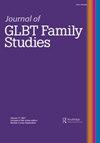重新定义集体主义:有色人种和土著居民的家庭和社区:特刊导言
IF 2
Q2 FAMILY STUDIES
引用次数: 3
摘要
我们怀着极大的热情向您介绍我们关于性和性别多样性(SGD)有色人种和土著人(POCI)的家庭和社区的特刊。我们相信,这一特刊有意义地增加了对SGD POCI个人及其家庭和社区之间关系的了解和认识。在整个特刊中,编辑和作者旨在使用积极的、基于力量的方法来探索POCI家庭和社区在促进和培养其SGD成员的福祉和成长方面所做的努力。本期特刊的核心是:(a)摆脱以白人为中心的SGD POCI幸福感模型和概念;(b) 为白人至上主义者的信念提供了一种反叙事,即POCI家庭和社区对SGD家庭成员的负面看法比他们的白人同行更多;以及(c)集中讲述SGD POCI及其集体关于文化适当措施、价值观和信仰的故事。研究充分证明了家庭和社区支持对SGD患者福祉的重要性(见Abreu、Rosenkrantz、Ryser Oatman、Rostosky和Riggle,2019)。缺乏家人支持的SGD患者的身心健康状况较差(例如,焦虑、抑郁、自杀意念增加;Bouris等人,2010年;McConnell、Birkett和Mustanski,2016年)。此外,由于异规范性和自恋,当一个人被认定为SGD时,家庭成员往往会经历强烈的情绪反应(见Chrisler,2017;Huebner、Roche和Rith,2019)。大多数专注于SGD个人及其家庭和社区的奖学金来自美国以白人为主的个人,很少关注理解种族、族裔和文化的作用(见Abreu、Riggle和Rostosky,2020)。鉴于这些发现,编辑们希望创建一期特刊,通过放弃将SGD POCI及其家庭和社区描述为缺陷的比较研究,提供关于SGD POCI及其家庭和社会的全面叙述。编辑们希望这期特刊能够利用适当的文化视角对SGD POCI故事进行独特的讨论。在本期中,我们试图纳入学者和从业者提交的学科和跨学科报告,包括实证研究、批判性分析和评论,为实践、政策和未来研究方向提供信息。本期特刊的作者回应了这一呼吁:1)探讨在家庭和社区背景下研究SGD POCI的跨部门方法,2)强调SGD POCC在其家庭和社区中的经验,3)使用基于积极和力量的方法来理解SGD POCI的经验,4)对SGD身份影响他们本文章由计算机程序翻译,如有差异,请以英文原文为准。
Redefining Collectivism: Family and Community among Sexual and Gender Diverse People of Color and Indigenous People: Introduction to the Special Issue
Is with great enthusiasm that we introduce to you our special issue on family and community among sexual and gender diverse (SGD) People of Color and Indigenous People (POCI). We believe that this special issue meaningfully increases knowledge and awareness of the relationship between SGD POCI individuals and their families and communities. Throughout the special issue, the editors and authors aimed to use positive, strength-based approaches to explore the efforts of POCI families and communities in promoting and cultivating the well-being and growth of their SGD members. At its core, this special issue sought to: (a) move away from White-centered models and conceptualizations of SGD POCI well-being; (b) provide a counter narrative to the White-supremacist belief that POCI families and communities hold more negative views toward SGD family members than their White counterparts; and (c) center the stories of SGD POCI and their collective about culturally appropriate measures, values, and beliefs. Research has well-documented the importance of family and community support in the wellbeing of SGD individuals (see Abreu, Rosenkrantz, Ryser-Oatman, Rostosky, & Riggle, 2019). SGD individuals who lack support from their family experience poorer physical and mental health outcomes (e.g., anxiety, depression, increased suicidal ideation; Bouris et al., 2010; McConnell, Birkett, & Mustanski, 2016). Also, because of heteronormativity and cissexism, family members often experience intense emotional reactions when an individual identifies as SGD (see Chrisler, 2017; Huebner, Roche, & Rith, 2019). Most of the scholarship focused on SGD individuals and their families and communities comes from predominantly White individuals in the United States, with little attention given to understanding the role of race, ethnicity, and culture (see Abreu, Riggle, & Rostosky, 2020). Given these findings, the editors wanted to create a special issue that provides holistic narratives about SGD POCI and their families and communities by moving away from comparative studies that depict SGD POCI and their families and communities as deficient. It was the editors’ hope that this special issue would allow for unique discussions about SGD POCI narratives using appropriate cultural lenses to contextualize SGD POCI stories. In this issue, we sought to incorporate disciplinary and interdisciplinary submissions from scholars and practitioners, including empirical studies, critical analyses, and reviews to inform practice, policy, and directions for future research. The authors in this special issue responded to this call by: 1) addressing intersectional approaches to studying SGD POCI in family and community contexts, 2) highlighting the experiences of SGD POCI within their families and communities, 3) using positiveand strength-based approaches to understanding the experiences of SGD POCI, 4) conducting systematic analyses of theways in which SGD identities impact their
求助全文
通过发布文献求助,成功后即可免费获取论文全文。
去求助
来源期刊

JOURNAL OF GLBT FAMILY STUDIES
FAMILY STUDIES-
CiteScore
3.90
自引率
0.00%
发文量
0
期刊介绍:
The Journal of GLBT Family Studies is a much-needed resource on the working dynamics of the diverse family structures found in every corner of the world. This groundbreaking new journal addresses the vital issues facing gay, lesbian, bisexual, and transgender individuals and their families. Edited by Dr. Jerry J. Bigner, who has provided expert witness testimony in legal cases and in the litigation involving same-sex marriages in Canada, the journal features interdisciplinary studies and scholarly essays on topics related to GLBT family life and functioning as well as relationships with other families.
 求助内容:
求助内容: 应助结果提醒方式:
应助结果提醒方式:


